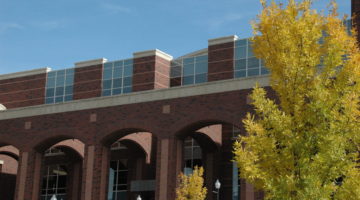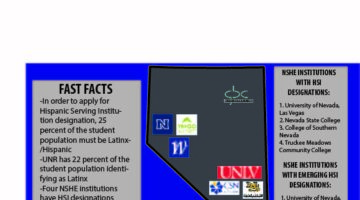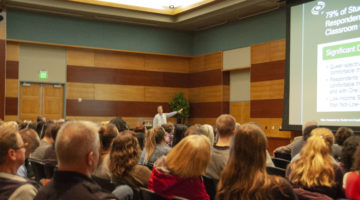
Andrea Wilkinson/Nevada Sagebrush
Progressive activist Shaun King speaks to a crowd of people in the Glick Ballrooms inside the Joe Crowley Student Union on Monday, Sept. 25. King is the second speaker in the ASUN Speaker Series about free speech and civil discourse of opinions.
On Monday, Sept. 25, civil rights activist Shaun King spoke to students on issues of police brutality, Black Lives Matter Movement and other social justice issues.
King’s presentation comes as part of ASUN’s speaker series. The University of Nevada, Reno, invited activist Lauren Cooley earlier this month to represent the conservative end of the political spectrum while King represents the liberal side. The goal of the series is to create an environment for students to listen to the perspectives of people who may have a different opinion than their own.
“It allows students to be diverse and not offer one side of the story,” said business student Kendall French. “It’s good to have all the knowledge you can about a subject to make more informed decision about politics and policies that are happening around you. So you’re not only making one-sided decisions.”
At college, King studied history at Morehouse College, a historically black private institution. Since then King has been a social justice writer for news outlets such as Daily Kos, The New York Daily News and is now a columnist for The Intercept.
During his presentation, King addressed President Trump’s response to the current issue of sports athletes kneeling during the national anthem.
“They’re not protesting the flag the military or the army, they are protesting police brutality and injustice,” King said. “If you don’t know that then you haven’t been listening. That is part of America. We are not listening.”
After the event, King took questions from the audience. Junior Jose Segura expressed his concern on how students can defend themselves in an argument with a person that might only accept the ideologies of white supremacy.
“That is a question that people are struggling with on college campuses all over the country,” King said. “I have really grown to believe that we really need at least some clearer parameters on what hate speech is and an understanding of the damage that it causes and the potential damage that it can incite. What we have now all over the country is people delivering hate speeches just because they can. […] For those of us in the room that are affected by hate speech we need say that this does not create a safe environment for me physically or emotionally. […] We seem to be allergic from actually improving this country.”
Students also shared their story of being a black individual in America.
“I grew up in a predominantly white town and as a kid growing up I was too white to be black and too black to be white,” said Wade Gainer. “I’d say up until five years ago I started to embrace my blackness and what it meant to be black. It is not until there is an issue when we start to talk about those things that make us uncomfortable. […] I find that trying to explain people my experiences makes me tired, agitated, and angry to point where I’m almost afraid of my own blackness. How do you deal with that?”
King praised Gainer for sharing his story and respected his courage for asking this question.
“I do think we live in a time where you should not be afraid of showing 360 degrees of your humanity,” King said. “It is true, and I get it but because of stereotypes and the reality of society you are constantly aware that you will be held to standards that other people won’t. That’s so disturbing and so problematic I want to encourage you that as you grow and mature to find ways to not suppress the fullness of who you are. It’s not normal to be in this society and not behave. Not only that, it’s not healthy.”
King hopes that students will learn that in order to be a part of the conversation, students have to be front and center.
“You need a ton of energy and we have that energy and fits and spritz,” King said. “Change requires people. […] Now, it doesn’t have to be all of us but a few rows of us, sometimes it’s all we need to bring about serious change on a college campus.”
Karolina Rivas can be reached at mpurdue@sagebrush.unr.edu and on Twitter @karolinarrivas.












